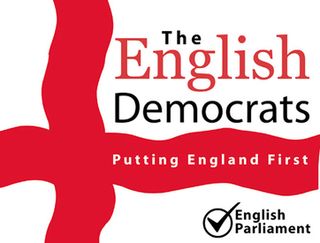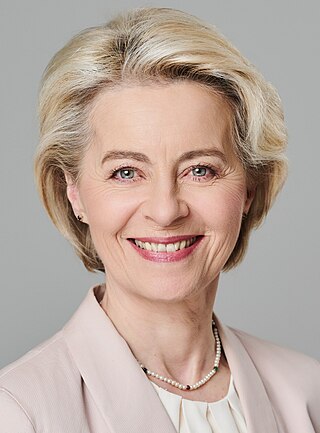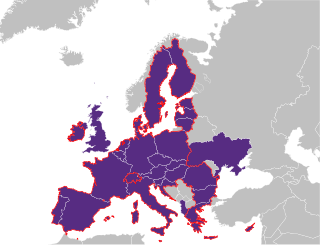
Euroscepticism, also spelled as Euroskepticism or EU-scepticism, is a political position involving criticism of the European Union (EU) and European integration. It ranges from those who oppose some EU institutions and policies and seek reform, to those who oppose EU membership and see the EU as unreformable. The opposite of Euroscepticism is known as pro-Europeanism.
The Referendum Party was a Eurosceptic, single-issue political party that was active in the United Kingdom from 1994 to 1997. The party's sole objective was for a referendum to be held on the nature of the UK's membership of the European Union (EU). Specifically, it called for a referendum on whether the British electorate wanted to be part of a federal European state or to revert to being a sovereign nation that was part of a European free-trade bloc without wider political functions.

The English Democrats are a right-wing to far-right, English nationalist political party active in England. Being a minor party, it currently has no elected representatives at any level of UK government.

The Christian Peoples Alliance (CPA) is a minor Christian right political party in the United Kingdom. The party was founded in its present form in 1999, having grown out of a cross-party advocacy group called the Movement for Christian Democracy. The first leader of the party was Ram Gidoomal; Alan Craig took over from him in 2004 and resigned in 2012. He was replaced by Sidney Cordle, the party's current leader.

Elections to the European Parliament take place every five years by universal adult suffrage; with more than 400 million people eligible to vote, they are the second largest democratic elections in the world after India's.

Elections in Belgium are organised for legislative bodies only, and not for executive functions. Direct elections take place for the European Parliament, the Chamber of Representatives, the Parliaments of the Regions, the Parliaments of the Communities, the provincial councils, the municipal councils and the councils of Districts of Antwerp. Voting is mandatory in federal elections, and all elections use proportional representation which in general requires coalition governments.

The Alliance for the Future of Austria is a right-wing populist, national conservative political party in Austria.
Mae Sexton is an Irish former independent politician. She was previously a Progressive Democrats Teachta Dála (TD) for the Longford–Roscommon constituency from 2002 to 2007.

The Christian Party is a minor Christian political party in Great Britain.

Europe–Democracy–Esperanto is a pro-Esperanto European political alliance regularly participating in European elections. The party's main platform is the introduction of Esperanto as the official language of the European Union (EU) in order to make international communication more efficient and fair in economical and philosophical terms, based on the conclusions of a report by François Grin.
LEAP is a think tank established to analyse and anticipate global economic developments from a European perspective and to publish a paid-subscription monthly economic forecast bulletin. It was founded in 1997 under the title "Europe2020" by Marie-Helene Caillol and Franck Biancheri, the founder of the European student network AEGEE and one of the few pan-European parties, Newropeans and relaunched as LEAP in 2005. LEAP claims to be the first European website of anticipation, independent from any government or lobby.

Nicole Sinclaire is a British former politician who was leader of the We Demand a Referendum Party, and served as a Member of the European Parliament for the West Midlands from 2009 to 2014.

Freedom and Solidarity, also called Saska, is a centre-right liberal and libertarian political party in Slovakia. Established in 2009, SaS was founded by economist Richard Sulík, who designed Slovakia's flat tax system. It generally holds anti-state and neoliberal positions. After the 2020 Slovak parliamentary election, the party lost several seats in the National Council but became part of the coalition government with Ordinary People and Independent Personalities, For the People, and We Are Family. It is led by businessman Branislav Gröhling.

The 2014 European Parliament election was the United Kingdom's component of the 2014 European Parliament election, held on Thursday 22 May 2014, coinciding with the 2014 local elections in England and Northern Ireland. In total, 73 Members of the European Parliament were elected from the United Kingdom using proportional representation. England, Scotland and Wales use a closed-list party list system of PR, while Northern Ireland used the single transferable vote (STV).

An election of the Members of the European Parliament from the Netherlands was held on 22 May 2014. This is the 8th time the elections have been held for the European elections in the Netherlands.

Nigel Farage is a British MP for Clacton and former MEP for South East England who has stood as a candidate representing eurosceptic parties UK Independence Party (UKIP) and Reform UK since 1994. He was a Member of the European Parliament representing South East England from the 1999 election until the British withdrawal from the European Union in 2020, winning re-election four times. Farage has stood for election to the House of Commons eight times, in six general elections and two by-elections, losing in every attempt until 2024 in Clacton. He was also a proponent of the UK leaving the European Union in the 2016 referendum, in which the electorate voted to do so by 52% to 48%.

Volt Europa is a pro-European and federalist European political alliance. It operates as a pan-European umbrella for subsidiary parties sharing the same name and branding. Despite its organisation and being referred to as a "European party" or "transnational party", Volt does not yet meet the requirements to register as a European political party.

The 2024 European Parliament election was held in the European Union (EU) between 6 and 9 June 2024. It was the tenth parliamentary election since the first direct elections in 1979, and the first European Parliament election after Brexit. A total of 720 Members of the European Parliament (MEPs) were elected to represent more than 450 million people from 27 member states. This election also coincided with a number of other elections in some European Union member states.

Volt United Kingdom, commonly known as Volt UK, is a pro-European political party in the United Kingdom. It is the British branch of Volt Europa, a political movement that operates on a European level.

Volt Luxembourg is a political party in Luxembourg. It is an internal section of Volt Europa and was founded in 2018. It received 2.11% of the vote in the 2019 European elections, which meant that the party did not win a mandate.

















